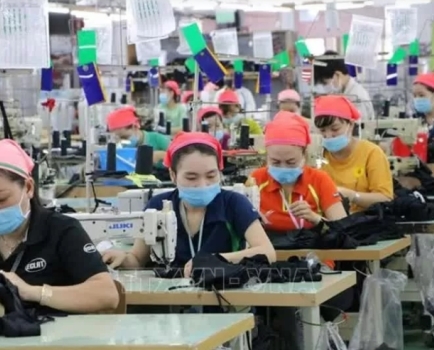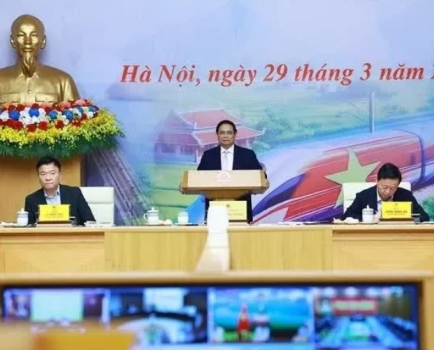Businesses need to prepare themselves to tackle trade defence instruments
Wed, 20 Nov 2019 14:04:00 | Print | Email Share:
Within the context of tougher competition on imported goods and additional trade defence instruments being imposed by an increasing number of countries worldwide, Vietnamese businesses have been advised to handle and adapt to these safeguard measures in a timely manner.

Illustrative image (Source: Internet)
Aside from joining the World Trade Organization (WTO), the country has signed 17 free trade agreements (FTAs), including several new-generation FTAs such as the Comprehensive and Progressive Agreement for Trans-Pacific Partnership (CPTPP) and the EU-Vietnam free trade agreement (EVFTA).
The implementation of the commitments outlined in these trade deals offers plenty of opportunities for the national economy, in addition to providing a boost to the production sector in the context of fiercer competition from imported goods, especially those coming from CPTPP and EVFTA member states.
According to statistics, the Ministry of Industry and Trade (MoIT) has begun an investigation into 15 trade remedy cases, including eight anti-dumping lawsuits, six self-defence cases, and one trade remedy evasion.
As of the end of September, up to 154 trade remedy cases had been initiated by 19 nations and territories regarding Vietnam’s exports.
The United States has launched the largest number of investigations with 30 cases, making up 19 per cent of the total, followed by Turkey (21 cases), equaling 14 per cent, India (20 cases), at 13 per cent, and the EU (14 cases), at 9 per cent.
The main issue being raised was anti-dumping investigations with 87 cases, accounting for 56 per cent, followed by 33 safeguard cases, 19 anti-dumping cases, and 15 anti-subsidy cases.
According to the Trade Remedies Authority of Vietnam under the MoIT, 15 of the cases remained modest in comparison with over 150 cases that foreign countries have launched into the nation’s exports.
This figure can be attributed to the country’s policy of encouraging trade liberalisation and the application of trade defence measures in necessary cases.
The MoIT stated that trade remedy measures have contributed to protecting jobs for hundreds of labourers within the industrial production sector, whilst also encouraging domestic production and supporting the balance of international payments.
Additionally, the trade defence tax has also served to generate revenue for the state budget with tax collections reaching thousands of billions of VND.
This has led to a number of firms significantly improving their production and avoiding losses, including Dinh Vu-Hai Phong (DAP-Vinachem), Viet Trung Steel Joint Stock Company, and Pomina Steel Corporation.
Both DAP-Vincachem Joint Stock company and Viet Trung Steel Joint Stock Company have been under consideration to be removed from the list of 12 loss-making projects within the industry and trade sector.
Moreover, trade defence measures have served to reduce the dependence on imported goods, especially for essential goods such as iron, steel and fertilizers for the national economy.
Handling trade remedy cases
According to Nguyen Thi Thu Trang, Director of the WTO Integration Centre under the Vietnam Chamber of Industry and Trade, several of the country’s export enterprises have failed to be proactive enough when it comes to dealing with the risks of the trade remedy investigations. In addition, many have failed to face up to the adverse impact that these cases can cause towards production and export activities.
Many firms have not made sufficient preparations to deal with trade remedy cases, with many attempting to avoid being drawn into investigations, causing a negative impact on their operations.
Trang advised businesses to quickly acquire knowledge regarding the procedures in lawsuits and their export markets in order to effectively handle trade remedy cases.
As a result, local enterprises must improve their knowledge on trade remedy cases and prepare the necessary documents in a transparent manner, acquire accurate legal information, and co-operate with investigative units in order to prove their export activities are done in accordance with international rules and regulations.
The Trade Remedies Authority of Vietnam under the MoIT has submitted a project to the Government on effectively building and operating an early warning system on trade remedy as a means of supporting the Vietnamese business community in coping with trade remedy measures and protecting their legitimate interests.
The Trade Remedies Authority of Vietnam has also instructed firms to handle trade remedy cases initiated by foreign countries in a bid to reduce the negative impact while standing alongside enterprises to protect their rights throughout the process.
The MoIT will offer updated information to businesses so they are able to devise proper orientations on investment in the context of international integration.
By: VOV
Source: https://english.vov.vn/economy/businesses-need-to-prepare-themselves-to-tackle-trade-defence-instruments-406263.vov
---------------------------------------------
Same category News :













